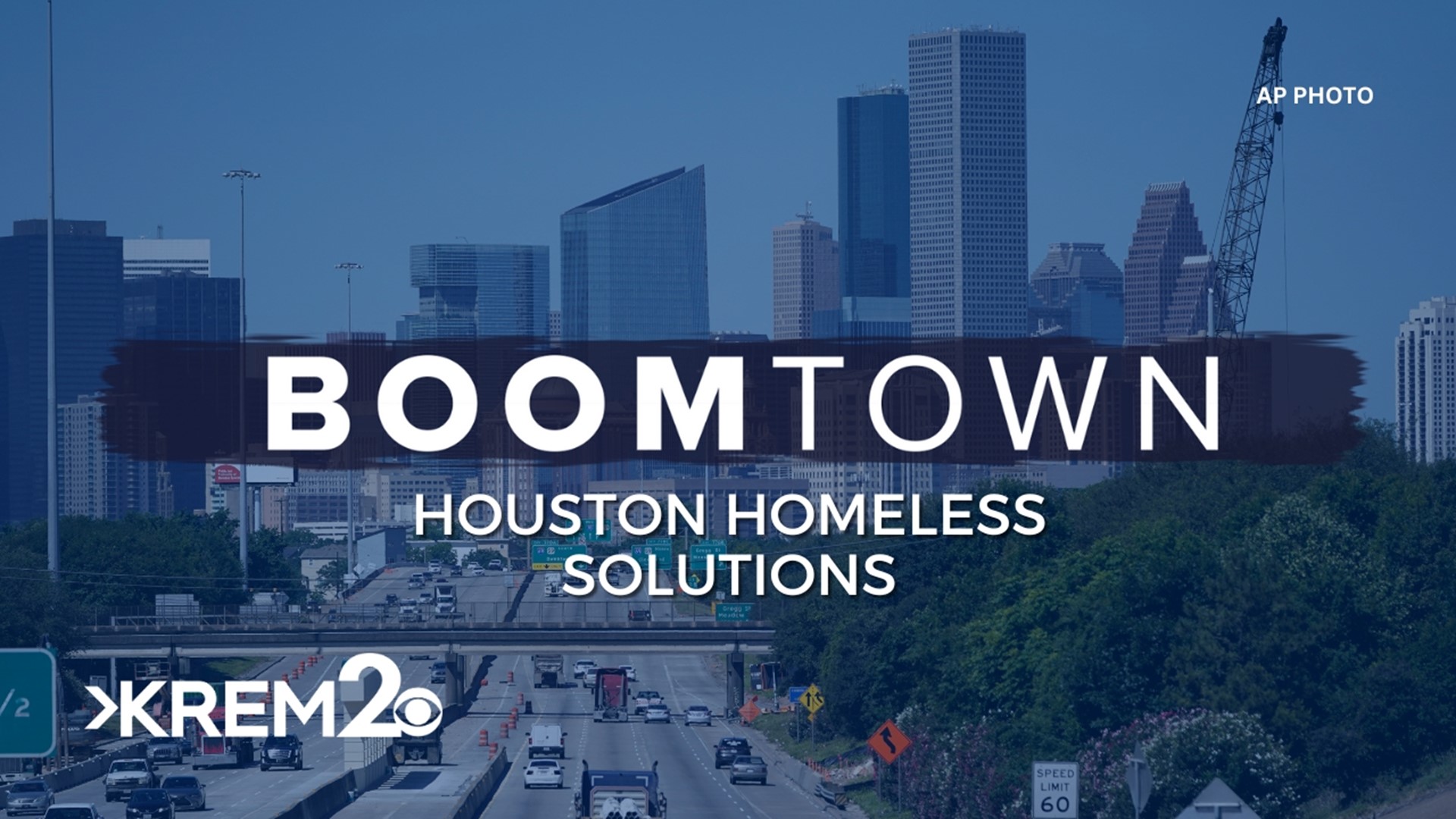HOUSTON — For the last few years, Spokane city leaders have often cited Houston, Texas’ homeless solutions as a model they would like to emulate. So, in October, KREM 2 sent Whitney Ward and I to Houston, to see firsthand what they’re doing right and how we can apply it here in Spokane.
For the past 10 years, governmental agencies, non-profits and businesses in Houston have all worked together to reduce homelessness by more than 60% and they all agree, it's because they prioritize placing people into permanent housing instead of a temporary fix.
This housing first initiative is what Mike Nichols, CEO and President of the Coalition for the Homeless Houston/Harris County, says is the cornerstone to their success.
”When we say housing, think of it as a three legged stool,” said Nichols. “It's a real house or apartment, a place with a key and a lock and air conditioning and heating, and a refrigerator and stove. It’s places where you can live for a long time after you overcome the trauma of being homeless. In addition to that, there's a subsidy for the rent, to help people move ahead with their lives. And the most important leg, very important that's often forgotten, is case management, paid professional case management, to help people with all the problems that they would have moving from homelessness into a house, food, health care, mental health care, substance, all those issues, that people need to move forward with their lives.”
Their region has prioritized housing the most vulnerable people first, something that was a bit of a controversial decision at the time.
“The bottom line is who is most likely to die, who is most likely to die on the street tonight and they are housed first,” said Nichols. “That was a giant decision because there were people and entities or organizations, saying we need to house the people who are going to be most successful. And the community came forward and says no, we're gonna house the most vulnerable first.”
One of the 28,000 people who has benefitted from this program is Shalina Polkey. She and her son lived in their car for nearly two years before finding out about the Coalition for the Homeless and the services they provide to area residents.
“It hurt a lot just to look at my son and know that I want better for him and I couldn't provide that.” said Polkey.
They were often able to stay at a shelter for the night, but sometimes that created more challenges.
“Because I did have some income, I wasn't on the priority of the list. So like they would tell me, we could come there and sleep at night but then, we got to leave, because they don't have no space. So it was like okay, go downtown, go sleep better at a shelter and not have enough gas to get back to the northside to take my son to school or have money for food.”
Finally, Shalina got an appointment with one of the hundreds of organizations working to help people just like her, get a place to call home.
“I got my house,” says Polkey. “And after inspection, and probably like three weeks to a month, I was in my first apartment.”
The Houston Continuum of Care, who oversees the area’s homeless response, uses HUD (Housing and Urban Development) vouchers to pay for these homes.
“I think there is often that excuse that there's a lack of affordable housing, but if you look at the rent available through HUD vouchers, it will clearly pay for housing almost anywhere in the country,” says Nichols.
Those same HUD, or Housing Choice Vouchers can and are used in the Spokane area as well. The main difference between what Spokane is doing and what Houston is doing, is that in Houston they partner with hundreds of organizations and businesses who collaborate. Each has their own lane of services that they provide but they all work together under the mission of housing people first.
They also work with landlords and property managers throughout the city to get people placed.
“When you go to these landlords and say, let me tell you what we have here. Yes, these people have, may have issues, they may have criminal records, they may have had evictions. But what you're gonna get is regular funding with this rent subsidy, and you're gonna get case management,” said Nichols. “Last you talk to the landlord and say, you know, we had this 85% to 90% success rate. That's the same success rate you have with the average tenant.”
Property owners like Jamil Hassan say the partnership is great.
“From my experience, there may be few of them that are just not appreciative of the opportunity that they get when they get a home,” said Hassan. “But I would say over a majority of them are very appreciative of being in a home.”
It’s a partnership that’s clearly working. Over the last decade, the homeless population in Houston has steadily declined and cities all over the world, including Spokane, are flocking there to learn what they’re doing so well. Now it’s up to leaders in the Spokane community to decide whether or not this model can work for us as well.
The full interview with CEO Mike Nichols can be seen below:
WATCH RELATED: Boomtown | Could Houston have the answers to homelessness in Spokane?

